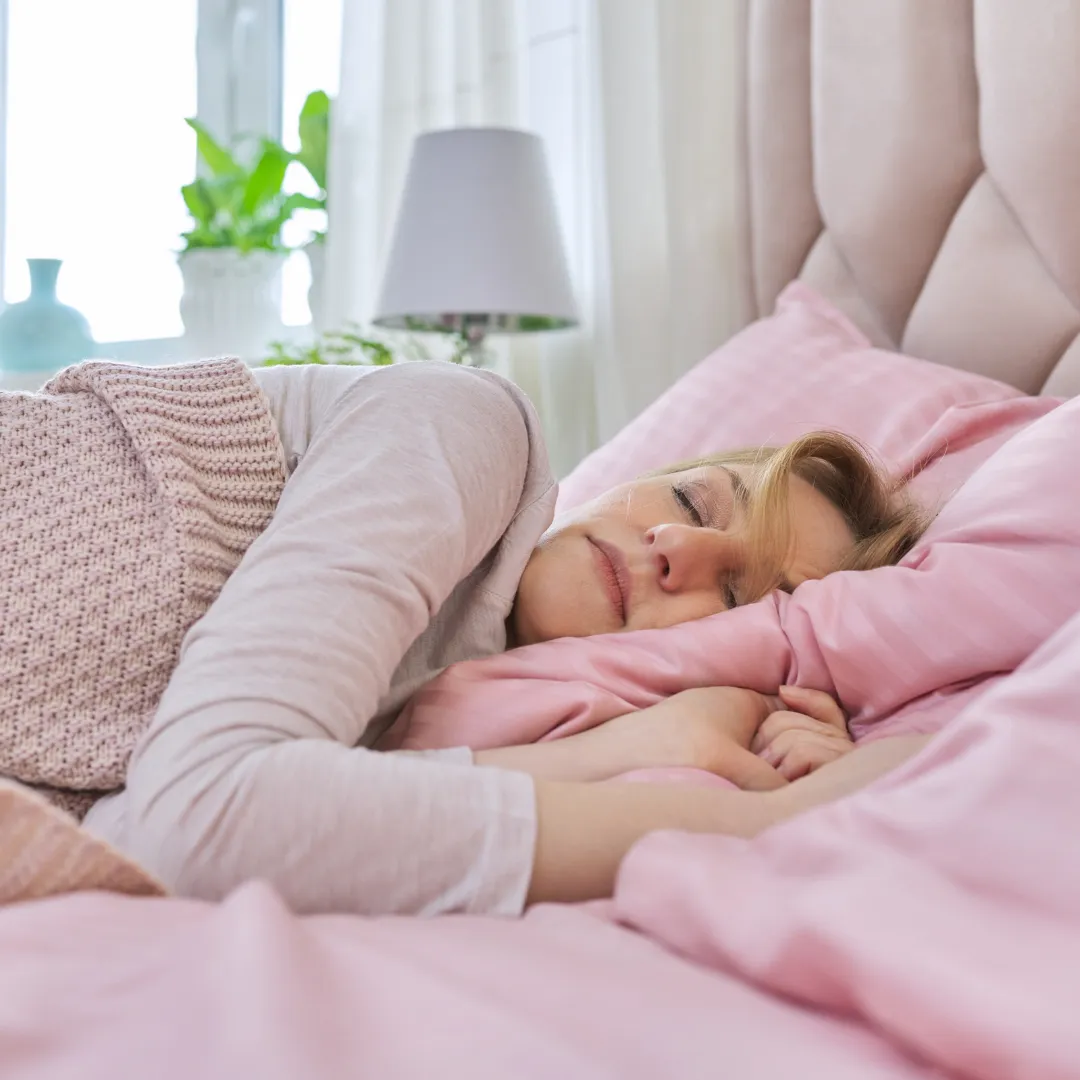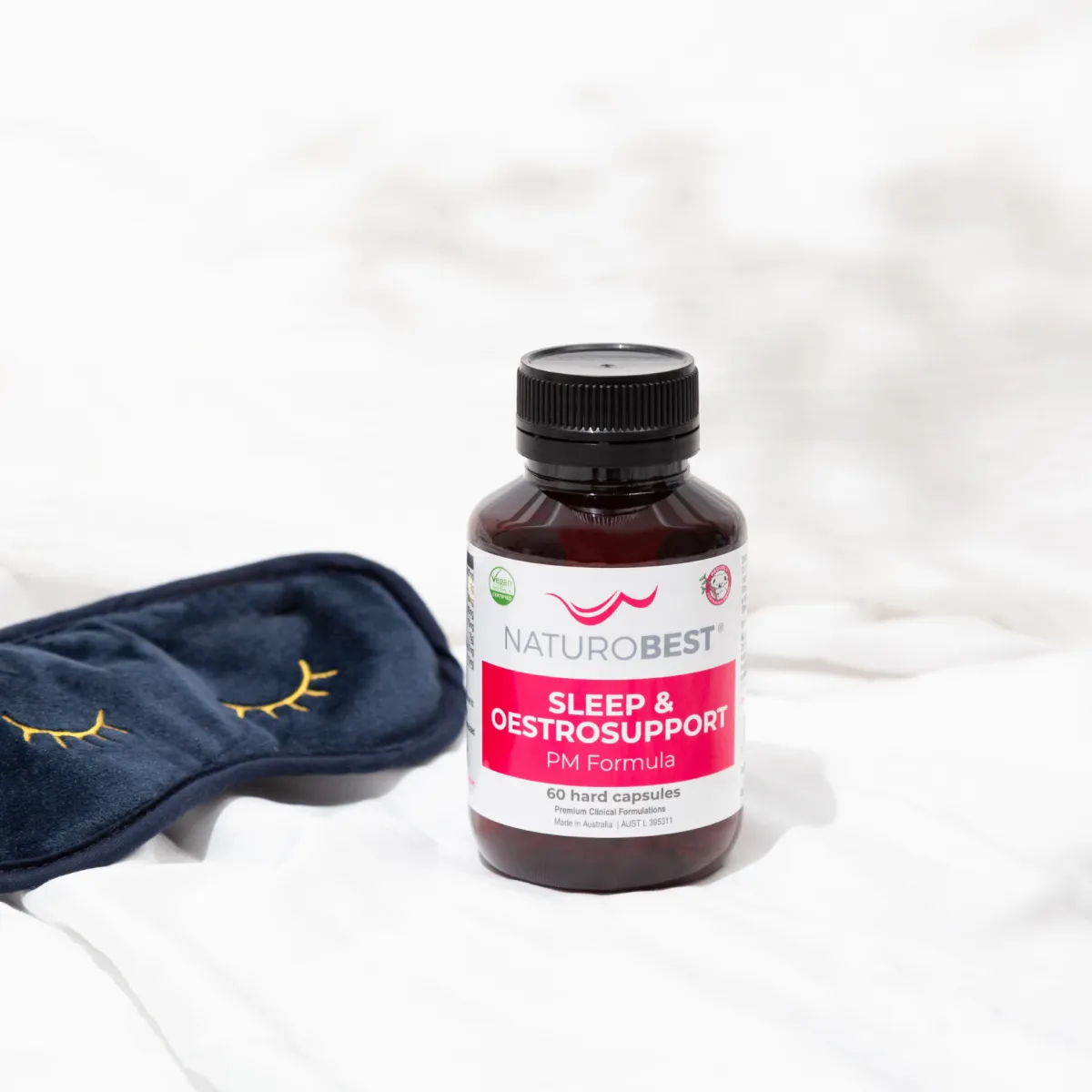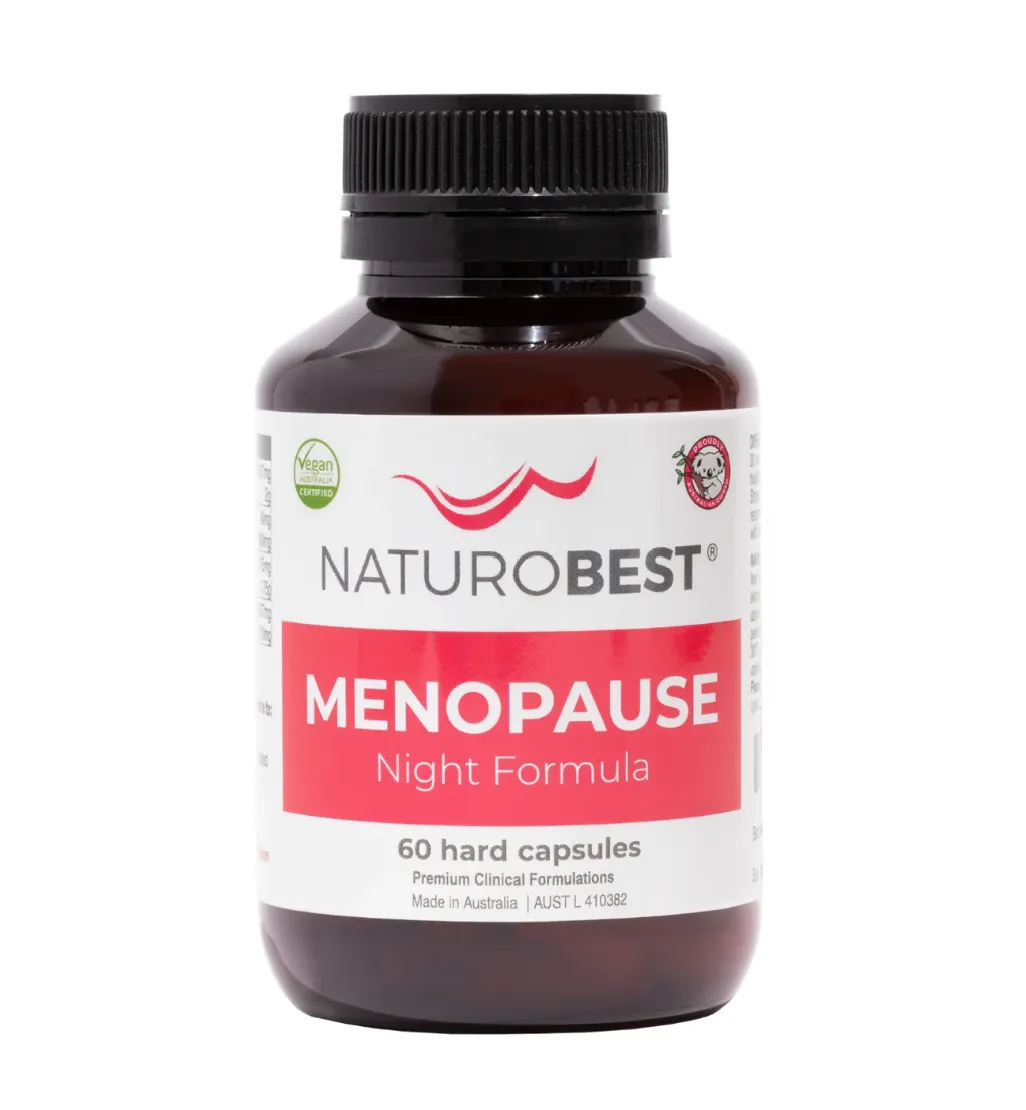Perimenopause Guide
Helpful advice, insight and empowerment
for your perimenopause experience.
How do you know if what you're feeling is perimenopause?

How to Manage Poor Sleep
How to Manage Poor Sleep in Perimenopause
Author Evie Ryan – NaturoBest
What happens in Perimenopause?
Perimenopause is the transition through to the event of menopause. The time period of perimenopause can vary a lot from woman to woman. The length of perimenopause can be from one to ten years, typically on average around four to six years.
Perimenopause is also known as the menopausal transition. Menopause occurs once you have not had a menstrual period for twelve consecutive months. After this, you will then be post-menopausal.
There are two stages of perimenopause. The early stage of perimenopause is characterised by mostly regular periods with minor changes and the late stage of perimenopause characterised by cycles becoming much more irregular (at least 2 months or more) up to the final menstrual period.
Hormonal Changes During Perimenopause
Your reproductive hormones will begin to change and fluctuate more in perimenopause. It will often start with low progesterone and a temporary increase in oestrogen levels and end with low oestrogen levels and low progesterone levels.
Other hormones change during perimenopause such as insulin regulation and cortisol regulation which can impact our metabolic and mental health. The low progesterone levels paired with high oestrogen in perimenopause often contributes to the symptoms you may experience.
Signs & Symptoms of Perimenopause
· Changes to your period – longer/shorter cycles, longer/shorter bleeds, change in heaviness.
· Mood changes – PMS, anger, irritability, sadness, fatigue, brain fog, forgetfulness.
· Hot flushes and night sweats.
· Poor sleep – changes to sleep quality.
· Low libido, headaches, sore breasts, weight gain, vaginal dryness, dry skin, sore muscles or joints.
How Does Perimenopause Impact Sleep?
Many women can experience a change to their sleeping patterns coming into perimenopause. For most women, these changes are mild and temporary during the menopausal transition. For some women however, their sleeping patterns can be severely disturbed during perimenopause, and they look for solutions for their sleep during this time.
Sleep in perimenopausal women can be disturbed by various factors. Hot flushes and night sweats are a major cause of sleep disruption. Sore joints and muscles in perimenopause can also play a role in feeling uncomfortable during the night. Mood symptoms such as depression and anxiety during perimenopause can impact sleep onset and maintenance.
Poor sleep over a long period of time, can contribute to a higher risk of cardiovascular disease, weight gain and poorer mental health outcomes in menopausal women. Therefore, it is important that women have the tools to help improve and manage their sleep during perimenopause.
How to Manage Your Sleep in Perimenopause
There are many tools that you can add to your perimenopause sleep toolbox!
Here are some of my Naturopathic recommendations for promoting a healthy sleep pattern and nervous system support going into perimenopause.
Lifestyle & Dietary Practices for Perimenopausal Sleep
Lifestyle practices will always play an important role in promoting healthy sleep patterns in perimenopause. Reducing or eliminating caffeine, alcohol and smoking will all be very important lifestyle behaviours to work on to help you sleep better during perimenopause.
Alcohol and toxins impact the liver significantly, and the liver is important for detoxifying oestrogen. If our liver has a high toxin load, this can lead to excessive heat in the liver and waking up hot and irritated in the night. The liver energetically, is linked to anger – therefore making sure we look after our liver is an important thing to do for your sleep.
Other lifestyle recommendations would be to have good sleep hygiene (no screen time before bed, quiet/calm environment, blockout curtains, an open window for fresh air, light bedding/breathable materials such as bamboo or cotton etc.). Regular exercise that is nourishing such as yoga will also be helpful.
Dietary factors will be important to manage in perimenopause for our sleep. Reducing intake of caffeine and sugar is beneficial for sleep and blood sugar regulation. Increasing fibre, water, wholefoods (fruit, vegetables, legumes, nuts, meats, eggs) will be helpful to meet your nutritional needs for healthy sleep patterns and nervous system function.
Herbal & Nutritional Support for Perimenopausal Sleep
Herbal medicine can be an amazing addition to your perimenopause sleep toolbox. This is especially true for those of you who feel you’re doing everything right yet still have poor sleep. Herbs such as saffron, passionflower, chamomile, lavender and withania are all supportive and nourishing herbs that have been shown to soothe anxiety and promote healthy sleep patterns. Therefore, we have used these herbs to formulate NaturoBest’s Stress & Sleep PM Formula.
NaturoBest’s Menopause Night Formula contains herbs such as ziziphus, hops, valerian and sage that help to cool the body down, reduce night sweats, promote oestrogen balance, and enhance sleep quality. The Menopause Night Formula is specifically formulated for poor sleep in menopausal women or during perimenopause when oestrogen levels are low as hops is oestrogenic.
Extra nutritional support is a great addition to your perimenopause toolbox. Nutrients such as calcium, vitamin D and magnesium are required by the nervous system and help reduce premenstrual tension, cramps and promote healthy sleeping patterns. NaturoBest’s Calcium & MagnesiumPlus K2 & D3 contains these nutrients to meet your daily intake requirements. Nutritional support is important for meeting your nervous system requirements to allow it to function optimally.
I hope you have found this article beneficial if you are currently entering perimenopause. It is possible for perimenopause to be a positive experience for you and not all doom and gloom as it can sometimes be painted that way. I hope perimenopause can give you an opportunity for deeper self-love and help you to prioritise yourself and health coming into the next chapter of your life.
Hopefully you have a better understanding on what is happening in perimenopause and what you can do to best support yourself during this transition and finding what works for you.
With Love,
Evie Ryan – NaturoBest
Reference List
https://www.ncbi.nlm.nih.gov/pmc/articles/PMC4834516/
https://www.ncbi.nlm.nih.gov/pmc/articles/PMC9190958/

How to Manage Poor Sleep
How to Manage Poor Sleep in Perimenopause
Author Evie Ryan – NaturoBest
What happens in Perimenopause?
Perimenopause is the transition through to the event of menopause. The time period of perimenopause can vary a lot from woman to woman. The length of perimenopause can be from one to ten years, typically on average around four to six years.
Perimenopause is also known as the menopausal transition. Menopause occurs once you have not had a menstrual period for twelve consecutive months. After this, you will then be post-menopausal.
There are two stages of perimenopause. The early stage of perimenopause is characterised by mostly regular periods with minor changes and the late stage of perimenopause characterised by cycles becoming much more irregular (at least 2 months or more) up to the final menstrual period.
Hormonal Changes During Perimenopause
Your reproductive hormones will begin to change and fluctuate more in perimenopause. It will often start with low progesterone and a temporary increase in oestrogen levels and end with low oestrogen levels and low progesterone levels.
Other hormones change during perimenopause such as insulin regulation and cortisol regulation which can impact our metabolic and mental health. The low progesterone levels paired with high oestrogen in perimenopause often contributes to the symptoms you may experience.
Signs & Symptoms of Perimenopause
· Changes to your period – longer/shorter cycles, longer/shorter bleeds, change in heaviness.
· Mood changes – PMS, anger, irritability, sadness, fatigue, brain fog, forgetfulness.
· Hot flushes and night sweats.
· Poor sleep – changes to sleep quality.
· Low libido, headaches, sore breasts, weight gain, vaginal dryness, dry skin, sore muscles or joints.
How Does Perimenopause Impact Sleep?
Many women can experience a change to their sleeping patterns coming into perimenopause. For most women, these changes are mild and temporary during the menopausal transition. For some women however, their sleeping patterns can be severely disturbed during perimenopause, and they look for solutions for their sleep during this time.
Sleep in perimenopausal women can be disturbed by various factors. Hot flushes and night sweats are a major cause of sleep disruption. Sore joints and muscles in perimenopause can also play a role in feeling uncomfortable during the night. Mood symptoms such as depression and anxiety during perimenopause can impact sleep onset and maintenance.
Poor sleep over a long period of time, can contribute to a higher risk of cardiovascular disease, weight gain and poorer mental health outcomes in menopausal women. Therefore, it is important that women have the tools to help improve and manage their sleep during perimenopause.
How to Manage Your Sleep in Perimenopause
There are many tools that you can add to your perimenopause sleep toolbox!
Here are some of my Naturopathic recommendations for promoting a healthy sleep pattern and nervous system support going into perimenopause.
Lifestyle & Dietary Practices for Perimenopausal Sleep
Lifestyle practices will always play an important role in promoting healthy sleep patterns in perimenopause. Reducing or eliminating caffeine, alcohol and smoking will all be very important lifestyle behaviours to work on to help you sleep better during perimenopause.
Alcohol and toxins impact the liver significantly, and the liver is important for detoxifying oestrogen. If our liver has a high toxin load, this can lead to excessive heat in the liver and waking up hot and irritated in the night. The liver energetically, is linked to anger – therefore making sure we look after our liver is an important thing to do for your sleep.
Other lifestyle recommendations would be to have good sleep hygiene (no screen time before bed, quiet/calm environment, blockout curtains, an open window for fresh air, light bedding/breathable materials such as bamboo or cotton etc.). Regular exercise that is nourishing such as yoga will also be helpful.
Dietary factors will be important to manage in perimenopause for our sleep. Reducing intake of caffeine and sugar is beneficial for sleep and blood sugar regulation. Increasing fibre, water, wholefoods (fruit, vegetables, legumes, nuts, meats, eggs) will be helpful to meet your nutritional needs for healthy sleep patterns and nervous system function.
Herbal & Nutritional Support for Perimenopausal Sleep
Herbal medicine can be an amazing addition to your perimenopause sleep toolbox. This is especially true for those of you who feel you’re doing everything right yet still have poor sleep. Herbs such as saffron, passionflower, chamomile, lavender and withania are all supportive and nourishing herbs that have been shown to soothe anxiety and promote healthy sleep patterns. Therefore, we have used these herbs to formulate NaturoBest’s Stress & Sleep PM Formula.
NaturoBest’s Menopause Night Formula contains herbs such as ziziphus, hops, valerian and sage that help to cool the body down, reduce night sweats, promote oestrogen balance, and enhance sleep quality. The Menopause Night Formula is specifically formulated for poor sleep in menopausal women or during perimenopause when oestrogen levels are low as hops is oestrogenic.
Extra nutritional support is a great addition to your perimenopause toolbox. Nutrients such as calcium, vitamin D and magnesium are required by the nervous system and help reduce premenstrual tension, cramps and promote healthy sleeping patterns. NaturoBest’s Calcium & MagnesiumPlus K2 & D3 contains these nutrients to meet your daily intake requirements. Nutritional support is important for meeting your nervous system requirements to allow it to function optimally.
I hope you have found this article beneficial if you are currently entering perimenopause. It is possible for perimenopause to be a positive experience for you and not all doom and gloom as it can sometimes be painted that way. I hope perimenopause can give you an opportunity for deeper self-love and help you to prioritise yourself and health coming into the next chapter of your life.
Hopefully you have a better understanding on what is happening in perimenopause and what you can do to best support yourself during this transition and finding what works for you.
With Love,
Evie Ryan – NaturoBest
Reference List
https://www.ncbi.nlm.nih.gov/pmc/articles/PMC4834516/
https://www.ncbi.nlm.nih.gov/pmc/articles/PMC9190958/
Looking for some natural supplements to help?
Navigating all of the supplements on offer can be confusing. Here is some info our nutritionist shared about what might be helpful.
To help with balancing your nervous system for your mood, energy, sleep and hot flushes/night sweats try increasing progesterone naturally with:
B Vitamins
Black Cohosh
Lemon Balm
Magnesium- with Glycine
Vitamin D
Omega 3s
Ashwaganda
Based on these recommendations, below are some products that might be helpful for you to look into. Remember to always consult with your health care professional about your specific circumstances and symptoms first. Within our Thrive During Perimenopause programs we hold Q&A sessions where you can ask about symptoms and supplements to get the best recommendations for you.
Enter the discount code: AF-CHELSEAWEIR to get your discount on NATUROBEST products
Thriving During Perimenopause
To experience all that our team has to offer enquire now about our holistic
'Thrive During Perimenopause' programs.
Our Approach
A balance in strength and mobility exercise.
A focus on mindset and shifting priorities.
Realistic self-care routines for your busy schedule.
Address your specific concerns and symptoms.
Empowerment through knowledge and understanding of perimenopause changes.
Nourishing and moving your body out of love not guilt.
Prioritising stress management for balanced hormones.
Accountability, coaching and community connection.

© 2023 | Privacy Policy
Sunshine Coast, QLD, Australia
0432 362 818
support@thriveyogaandfitness.com
ABN: 50 458 891 585






